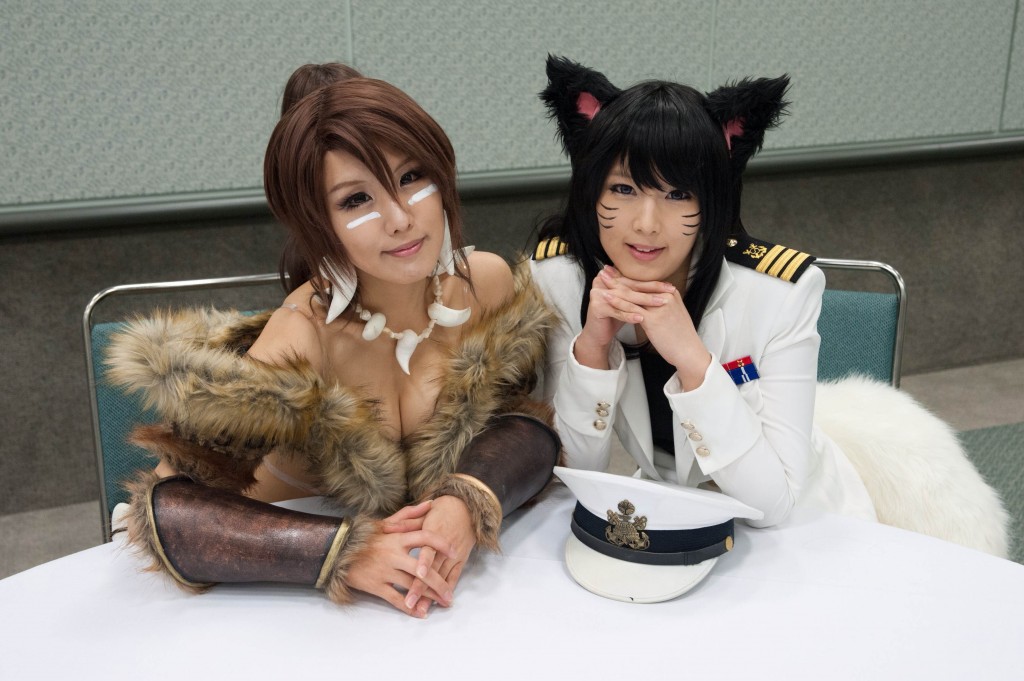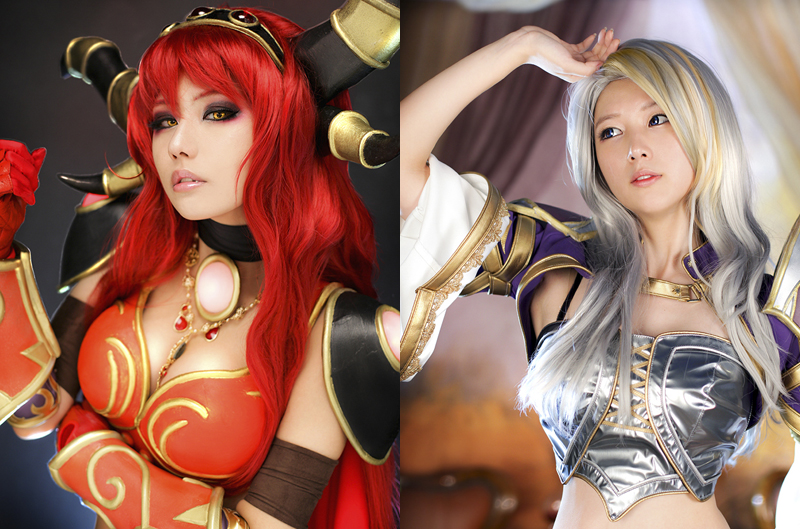- California Assembly OKs highest minimum wage in nation
- S. Korea unveils first graphic cigarette warnings
- US joins with South Korea, Japan in bid to deter North Korea
- LPGA golfer Chun In-gee finally back in action
- S. Korea won’t be top seed in final World Cup qualification round
- US men’s soccer misses 2nd straight Olympics
- US back on track in qualifying with 4-0 win over Guatemala
- High-intensity workout injuries spawn cottage industry
- CDC expands range of Zika mosquitoes into parts of Northeast
- Who knew? ‘The Walking Dead’ is helping families connect
Cosplay is serious business for Korea’s Spiral Cats

Tasha, left, as Nidalee from League of Legends, and Doremi as Ari at L.A. Anime Expo. (Courtesy of Spiral Cats)
By Tae Hong
When it comes to cosplay in South Korea, the Spiral Cats are the team you need to know.
“We’re the top team,” Tasha, its leader, joked. “There’s lots of cosplayers running after us, so we’re staying vigilant.”
Tasha and Doremi — each 28 and 23 years old, respectively, and named Oh Go-eun and Lee Hye-min — are the two permanent members of the country’s top professional cosplay team who arrived in Los Angeles for the first time as special guests for this year’s L.A. Anime Expo held in downtown.
Many from the tens-of-thousands-strong crowd gathered to see the two Cats members at a panel, Q&A and photo session at the event, some of them colorful displays of their own of characters from a wide array of fandoms.
Cosplay, an amalgamation of “costume play,” started as a hobby for anime and game enthusiasts but has since spread into a worldwide phenomenon. It’s more than a dress-up game: Amateur cosplayers come out in droves to events like the expo, while groups like the Spiral Cats, which started in 2009 as an amateur group but which announced its transition to the professional level in 2012, are profitable business models.
As professionals, cosplaying is a full-time job — Tasha calls costume playing an “all in.”
Tasha and Doremi, along with about 10 changing members, work as promoters and models for game and animation companies, most notably as League of Legends cosplayers.
“Korea is a country that has a very developed game culture,” Tasha said. “The domestic game market is very competitive. The number of companies that use cosplayers to promote newly launched games have increased.”
Make no mistake, though — cosplay culture is still unfamiliar to most Koreans. Doremi said what fascinated her about visiting L.A. was seeing so many casual cosplayers walking around on the streets, in the open.
Convention attendees usually pack their costumes at home and change into them when they arrive at the convention in Korea, Tasha said. Traveling while in cosplay is seen as a form of public harm, and there are only certain spaces where people can enjoy cosplay.
“As Spiral Cats became pro and as we appear on major broadcast stations like KBS, people see that cosplayers are game models and think, ‘Cosplay, that’s all right.’ So views are changing a lot,” Tasha said.
“There is still a sense of, ‘What is that?’ But now, they’re becoming more and more used to seeing us and identifying us as cosplayers. It’s developing,” Doremi agreed.
Spiral Cats began as a venture by a group of co-workers at a game development company, where Tasha worked as a graphic designer for backgrounds and 3D effects. She’s been with the team from the beginning, while Doremi is a recruit who has been a member for two years.
Both have similar stories when it comes to their initial interest in cosplay. For Tasha, it was attending an anime convention as a middle schooler and her parents’ subsequent support — mom with the sewing, dad with the camera — that did it. For Doremi, it was joining a cosplay club in middle school and learning how to shop for and make homemade costumes with her classmates.
What started as a hobby has now, of course, led to this career.
“When you’re an amateur cosplayer, you do it for fun and for personal enjoyment, to be happy,” Tasha said. “It’s not that doing it as a pro isn’t fun, but for amateurs, everything is OK if you yourself are satisfied with a cosplay. When you’re a pro, everyone has to be satisfied for it to be OK. That others look at you and think that it’s good — that’s the value investors find in commissioning us jobs.”
That’s fair, considering the group books big-name clients like Nexon, Neowiz Games, NCSOFT, Blizzard Entertainment and Riot Games, as well as smaller companies and mobile game developers.
They still make about 80 percent of their own costumes through roles designated for each cosplayer, which ranges from pattern finder to accessory maker and material gatherer.
After the Spiral Cats’ professional success, more and more cosplay teams are emerging in Korea, Tasha said. Meanwhile, the Spiral Cats have expanded to clients in the Philippines and China.
“Although the Korean market is big, there’s a lot of competitors cropping up, so we do feel the need to expand ourselves,” Tasha said.
So what’s next for the Spiral Cats? She and Doremi will be supporting characters in a KBS children’s drama, set to air this year, and plan to attend more overseas events.











![그룹 방탄소년단(BTS) [BTS 공식 트위터. 재판매 및 DB 금지]](http://www.koreatimesus.com/wp-content/uploads/2025/07/Untitled-5-copy-199x223.jpg)






lighthammer
July 12, 2014 at 9:59 AM
Lion Games is not. Riot Games is Right. Please Modify the Company name.